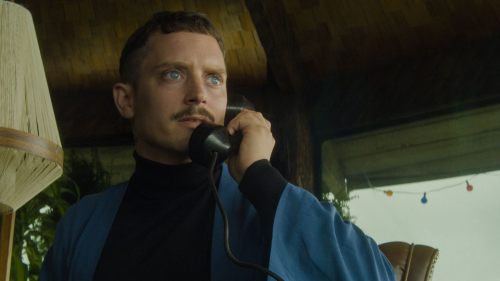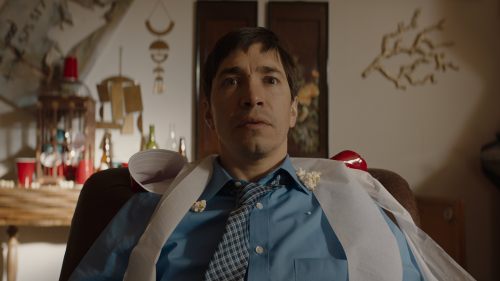Fantastic Fest Review: APPLECART Is Female-Centric Horror That’s Unafraid To Get Goofy
The thing that struck me upon leaving Applecart was just how willfully goofy the goddamn thing is.
Know before you read any further: that's meant in a good way. Without naming names, much of the contemporary indie horror from this particular sphere has been exhaustingly po-faced, frequently prioritizing edginess and extremism over fun. But Applecart’s broad satire, retro approach to its central threat, and engaged performances are prizes to be mined from this endeavor, an 86-minute breath of fresh air in a landscape full of thuddingly serious fare. That it’s unafraid to be silly as hell and leans on a uniquely female-driven narrative makes it a rare beast indeed.
After a '60s-set, Night of the Creeps-esque prologue indicating something supernatural is afoot in the film’s snowy mountain locale, we jump to the present to find Casey Pollack (Brea Grant) driving her family to a remote cabin that’s purported to have holistic healing properties. Casey’s husband James (AJ Bowen) is terminally ill, and the trip is a last ditch attempt to save him, though it’s clear James has entered the acceptance phase and is agreeing to the trip to placate a spouse terrified of losing her partner. The family heads up the mountain in good spirits, bickering but clearly full of love for one another.
Suddenly Applecart cuts to a true crime show about the characters to whom we’ve just been introduced, and a solemn host (Daniel Roebuck) informs us that Casey has murdered her entire family, while her daughter’s friend Becky Lane (Elise Luthman) remains missing to this day. It’s a ridiculous, kind of ballsy turn, and as the film cuts between this true crime series and the actual events, we come to learn what really happened, discovering along the way how a local politician (Barbara Crampton) is secretly involved in the chaos unleashed upon the family. We also spend the rest of the film on our toes, adjusting to the filmmaker’s risky choice to tell us the ending up front, and sticking around to see where the true crime and reality diverge and meet up again.
Any conversation about Applecart will center around this true crime framing device, and how well that does or doesn’t work. Its potential is not always maximized, but this reviewer found it to be a fun wrinkle of distinction in a crowded genre landscape. It’s played for laughs at first, but it’s also 100% the kind of collateral real-life nonsense that would happen around a case like this. (A political ad nestled inside this true crime program proves that 2017 is actually kind of hard to parody.) The absurdity of the tangent is something that feels right at home in a Don Coscarelli-produced horror film.
But something that shouldn’t be lost in the discussion is how writer/director Brad Baruh’s story inverts the gendered roles for this kind of horror film. Grant and Bowen are both in fine form, playing real, adult characters in a genre that hasn’t always afforded them that opportunity. A few years ago this script would’ve had Grant’s arc written for a leading man, while Bowen’s character, terminally ill but with a quiet humor and grace, would have been written as a wife. Not only is it flipped, but these characters seem determined to react to horror film situations as real people. When they find a mysterious stranger (Crampton) passed out in their yard, and she begins to act strangely in their home, there’s something oddly authentic in their responses to her increasingly antagonistic behavior.
And oh, that behavior. This is a Barbara Crampton we’ve never seen before. She’s played bad before, but never with such Nicolas-Cage-in-Vampire’s-Kiss-type relish. We’re told she’s up to no good the second we meet her, and as Hitchcock’s ticking time bomb under the table, watching her play quirky, barely-contained evil is a delight. She’s clearly having a blast as Leslie Bison, and it’s infectious.
That attitude is probably why Applecart tends to breeze past its shortcomings, for this viewer at any rate. The film’s structure is not always graceful, and the “true crime” segments might ultimately be undercutting tension and pace, but the movie’s darkly comic, often gleeful vibe, personified in Crampton’s performance, is too refreshing to dismiss. The story becomes even more female-centric in ways that would spoil the film’s final act, but suffice it to say it was fun to see a new horror entry at this level dial down the "bro" quotient to the degree this one does.
Some fest attendees were unforgiving toward the film’s very ‘80s monsters (zombies? Creepoids?), their herky-jerky, spook-a-blast physicality a bit out of step with the Deep Allegory we’ve come to expect from contemporary indie horror. Are they? Probably. But again, its refusal to adhere to a 2017 style guide is precisely what makes Applecart worth checking out. In a field of self-satisfied “elevated genre”, Applecart is at least swinging for a weird, fun fence that no one else seems to be.



